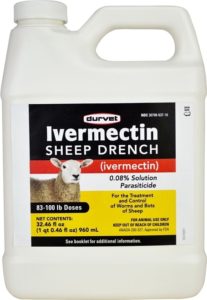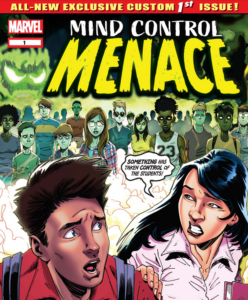Don’t deworm yourself, the toenail fungus solution, not the Avengers, and more
10 Apr 2021
Posted by Andrew Kantor
PCOM, represent!
More than 450 PCOM students — including, most importantly, student pharmacists — spent four days helping vaccinate 1,200 employees in the Newton County School System.

Kelsey and Kanan
From nose to brain
Having sinusitis appears to affect more than the sinuses — University of Washington researchers have found that it also affects the brain, leading to trouble focusing, depression, and other neurobiological symptoms.
Or as the school put it:
New research links sinus inflammation with alterations in brain activity, specifically with the neural networks that modulate cognition, introspection and response to external stimuli.
fMRI scans revealed changes in connectivity in various brain areas, including the frontoparietal network (“executive function, maintaining attention and problem-solving”) the default-mode network (“self-reference […] and mind-wandering”) and the salience network (“communication and social behavior”)
Greater than the sum of its parts
Treat Covid with ruxolitinib — meh. But Purdue biochemists found that Covid messes with the lungs in an unexpected way — it “causes expression of an activated complement system,” which usually happens in the liver.
By combining ruxolitinib (to target the complement response) with remdesivir (to fight the virus) you get a potential powerful treatment.
Oh, sheesh, this again?
Do not take an animal de-worming drug — ivermectin — to treat Covid-19. So say health officials. Really, though, do you need “health officials” to tell you that?
Yet — with a roll of the eyes, I’m sure — NIH scientists will test whether human ivermectin can treat Covid symptoms. (Kudos to them, really, because who would have thought bread mold could treat infections?)
“It’s like the new hydroxychloroquine,” said Angela Rasmussen, a virologist at Georgetown University’s Center for Global Health Science and Security. “It would be great if ivermectin did work — it’s been around for years and is cheap. But to my knowledge, there is no data that suggests it’s good for Covid-19.”

The sheep on the bottle should be a clue
All that said…
“Toenail fungus medication may also protect against COVID-19” — and that’s from actual researchers in Germany.
Researchers from the University of Muenster say the antifungal drug itraconazole (or Snoporax) killed the deadly bug in experiments. The antidepressant fluoxetine (Prozac) had the same effect, but worked best in conjunction with the more common coronavirus treatment remdesivir.
Age of Juul
Marvel and the FDA have teamed up to create a comic about the dangers of addiction — vaping, in particular. Honestly, what more is there to say. You can read it on Marvel.com or watch the 8:24 video.

Hydrogel 2.0
After a tumor has been removed, there can still be rogue cancer cells milling about. Now Japanese researchers have developed a hydrogel that can carry a medication to the site.
But that’s not a big deal.
These hydrogels protect the medication from breaking down. Also not news.
They can release those meds based on a change in the tumor site — temperature, pH, etc. Cool, but still not that new.
What’s new is that these hydrogels can be designed to respond to a variety of conditions, meaning they could conceivably release different meds depending on what’s going on at the site — temperature, pH, or oxygen concentration.
For instance, when conditions are just the right level of acidic in the tumor microenvironment, these DDSs [drug delivery systems] either shrink or swell and release the drug.
Growing brains is apparently ethical
A NASEM (National Academies of Sciences, Engineering, and Medicine) committee has determined that using human stem cells to create “tiny brainlike structures” doesn’t violate ethical guidelines … or, presumably, have philosophical implications.
[T]he committee concluded organoids aren’t capable of consciousness because they lack the many cell types and connected structures of a brain. Even recent organoid experiments that claimed to detect brain waves similar to those in a fetus found “relatively nonspecific” signals — the panel didn’t find this work ethically troublesome.
Also: Transplanting human cells into animal brains also gets the thumbs up.


